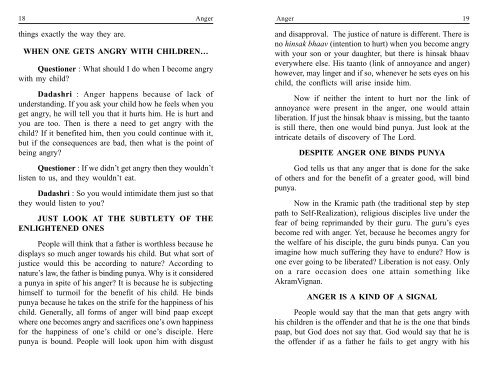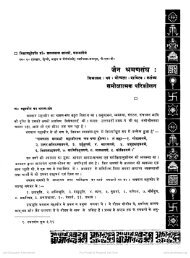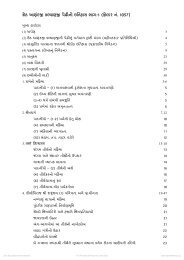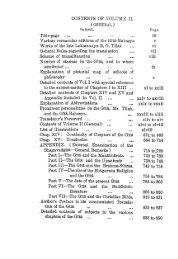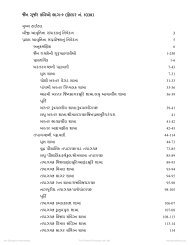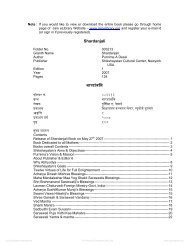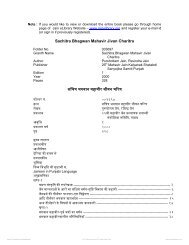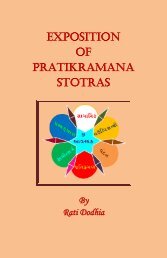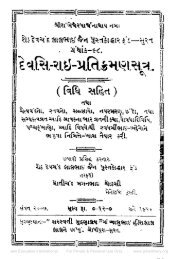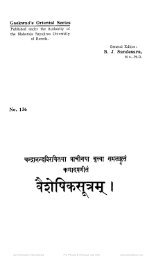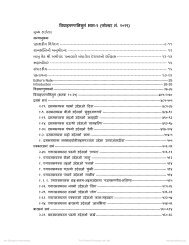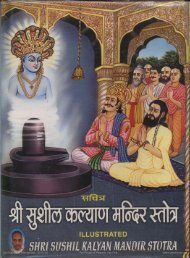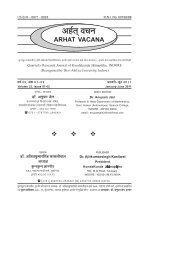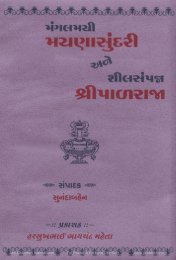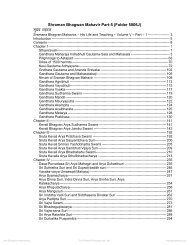Anger - Jain Library
Anger - Jain Library
Anger - Jain Library
You also want an ePaper? Increase the reach of your titles
YUMPU automatically turns print PDFs into web optimized ePapers that Google loves.
18 <strong>Anger</strong> <strong>Anger</strong> 19<br />
things exactly the way they are.<br />
WHEN ONE GETS ANGRY WITH CHILDREN…<br />
Questioner : What should I do when I become angry<br />
with my child?<br />
Dadashri : <strong>Anger</strong> happens because of lack of<br />
understanding. If you ask your child how he feels when you<br />
get angry, he will tell you that it hurts him. He is hurt and<br />
you are too. Then is there a need to get angry with the<br />
child? If it benefited him, then you could continue with it,<br />
but if the consequences are bad, then what is the point of<br />
being angry?<br />
Questioner : If we didn’t get angry then they wouldn’t<br />
listen to us, and they wouldn’t eat.<br />
Dadashri : So you would intimidate them just so that<br />
they would listen to you?<br />
JUST LOOK AT THE SUBTLETY OF THE<br />
ENLIGHTENED ONES<br />
People will think that a father is worthless because he<br />
displays so much anger towards his child. But what sort of<br />
justice would this be according to nature? According to<br />
nature’s law, the father is binding punya. Why is it considered<br />
a punya in spite of his anger? It is because he is subjecting<br />
himself to turmoil for the benefit of his child. He binds<br />
punya because he takes on the strife for the happiness of his<br />
child. Generally, all forms of anger will bind paap except<br />
where one becomes angry and sacrifices one’s own happiness<br />
for the happiness of one’s child or one’s disciple. Here<br />
punya is bound. People will look upon him with disgust<br />
and disapproval. The justice of nature is different. There is<br />
no hinsak bhaav (intention to hurt) when you become angry<br />
with your son or your daughter, but there is hinsak bhaav<br />
everywhere else. His taanto (link of annoyance and anger)<br />
however, may linger and if so, whenever he sets eyes on his<br />
child, the conflicts will arise inside him.<br />
Now if neither the intent to hurt nor the link of<br />
annoyance were present in the anger, one would attain<br />
liberation. If just the hinsak bhaav is missing, but the taanto<br />
is still there, then one would bind punya. Just look at the<br />
intricate details of discovery of The Lord.<br />
DESPITE ANGER ONE BINDS PUNYA<br />
God tells us that any anger that is done for the sake<br />
of others and for the benefit of a greater good, will bind<br />
punya.<br />
Now in the Kramic path (the traditional step by step<br />
path to Self-Realization), religious disciples live under the<br />
fear of being reprimanded by their guru. The guru’s eyes<br />
become red with anger. Yet, because he becomes angry for<br />
the welfare of his disciple, the guru binds punya. Can you<br />
imagine how much suffering they have to endure? How is<br />
one ever going to be liberated? Liberation is not easy. Only<br />
on a rare occasion does one attain something like<br />
AkramVignan.<br />
ANGER IS A KIND OF A SIGNAL<br />
People would say that the man that gets angry with<br />
his children is the offender and that he is the one that binds<br />
paap, but God does not say that. God would say that he is<br />
the offender if as a father he fails to get angry with his


